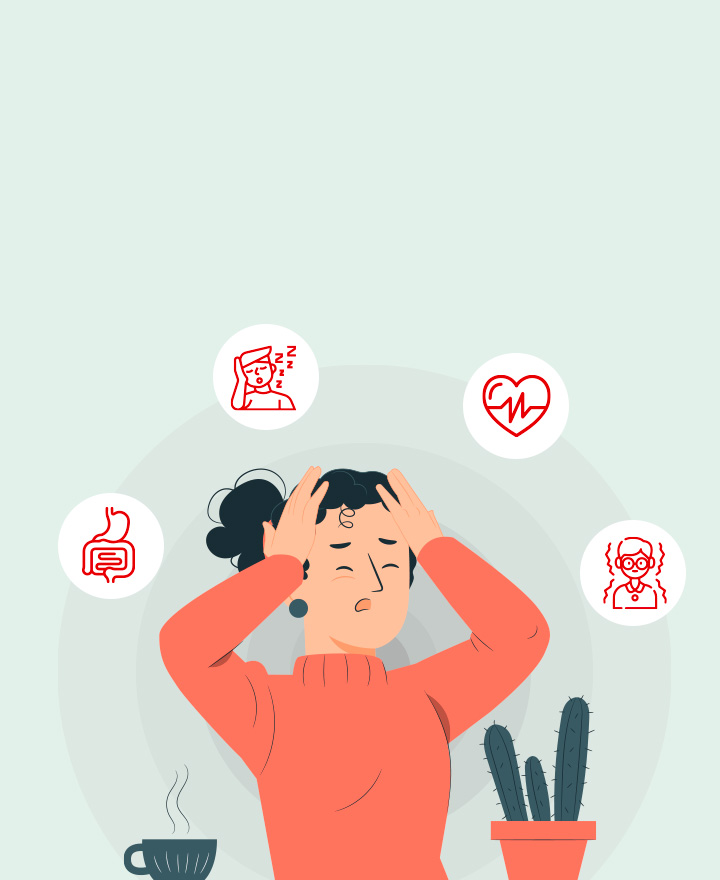

Anxiety – Everything You Need to Know to Fight It
Mental health issues have been on a sharp rise in recent years, thanks to the pandemic and its social, medical and economic repercussions. And anxiety is the biggest mental health problem plaguing the world.
So, in this article, we tell you all you need to know about the symptoms of anxiety, its causes, and ways in which you can treat it.
What is anxiety?
Anxiety is a feeling of fear about an upcoming event or a current situation that you are going through. It is the way that your body responds to stress. All of us experience anxiety in our lives, and these feelings usually are short-lived. However, some people have prolonged anxiety that does not disappear even after weeks or months. It disrupts your daily life and can be debilitating. When this happens, it is called an anxiety disorder.
Symptoms of anxiety
The specific symptoms of anxiety are different for each individual. However, when you experience anxiety, your body’s fight or flight reflexes are activated, and your body is on alert, looking for possibilities of danger. So, the common symptoms of anxiety include:
● Rapid heartbeat
● Hyperventilation
● Digestive issues, like acidity or diarrhoea
● Feeling panicked or tensed
● Restlessness or nervousness
● Sweating excessively
● Lack of sleep
● Obsessive-compulsive behaviour
● Not being able to focus on anything
● Avoiding people or situations that trigger your anxiety
● Feeling tired and weak
● Muscle twitching
● Panic attacks that cause dizziness, shortness of breath, numbness, chest pains, nausea, etc.
What causes anxiety?
The scientific community is still trying to understand the exact causes of anxiety disorders. It is possible that several factors combine to cause this condition, such as genetics, underlying health problems, other mental health conditions, brain chemistry, and environmental factors. Traumatic events of the past can also trigger anxiety.
How to treat anxiety?
If you or your loved ones are experiencing any signs or symptoms of anxiety, you should visit a mental healthcare professional. A diagnosis of anxiety disorder includes mental health tests, physical exams, and psychological questionnaires. Once you are diagnosed with an anxiety disorder, your healthcare provider will explore different treatment options with you. Treatment options include:
Lifestyle changes -
Not all treatments require medication. Some types of anxiety can be treated by incorporating lifestyle changes such as exercising every day, avoiding alcohol and smoking, getting enough sleep, eating healthy food, and trying relaxation techniques like yoga or meditation.
Medication -
In case of extreme anxiety disorders, your mental healthcare professional may prescribe sedatives or anti-depressants that will help you calm down and relieve symptoms of anxiety or reduce their severity.
Therapies -
Various types of therapies can help treat anxiety disorders. These include psychotherapy, art therapy, interpersonal therapy, cognitive behavioural therapy, dialectical behavioural therapy, etc. Speak to a mental healthcare professional about therapy options.
Lowering stress -
You can try at-home remedies to lower your stress or anxiety levels. Some techniques that you can try are:
● Meditation - meditation reduces anxiety by calming your nerves and helping you focus.
● Yoga - Yoga for stress relief is very effective for reducing anxiety.
● Art therapy - Adult colouring books, mandala art, affirmation cards, painting, doodling etc. are forms of art therapy that you can try on your own. They help relieve your stress.
● Deep- breathing techniques like pranayama can reduce anxiety.
● Being physically active - Exercising every day helps reduce stress and improves your mood by causing your body to release endorphins which are mood-enhancing hormones.
● Getting adequate sleep - Lack of sleep can increase your anxiety and restlessness. Try and get at least seven hours of sleep every night.
Conclusion
It can be challenging to cope with an anxiety disorder. Hence, try and find support systems that can help you navigate this. Join support groups or ask family and friends for help. Anxiety disorders are treatable, and it is possible to make a full recovery in most cases. With the right professional help, you can learn to manage the symptoms of anxiety and live a healthy life.
Disclaimer: This blog provides general information and discussions about health and related subjects. The information and other content provided in this blog, website or in any linked materials are not intended and should not be considered, or used as a substitute for, medical advice, diagnosis or treatment. Kindly contact your Doctor before starting a new medicine or health regime.
Related Articles
Anxiety In Children – What You Need To Know
How Social Media Affects Your Mental Health And Leads To Anxiety
Everything you need to know about eco anxiety
Published on February 04, 2022
























 Health Insurance
Health Insurance  Travel Insurance
Travel Insurance  Car Insurance
Car Insurance  Cyber Insurance
Cyber Insurance  Critical Illness Insurance
Critical Illness Insurance
 Pet Insurance
Pet Insurance
 Bike/Two Wheeler Insurance
Bike/Two Wheeler Insurance  Home Insurance
Home Insurance  Third Party Vehicle Ins.
Third Party Vehicle Ins.  Tractor Insurance
Tractor Insurance  Goods Carrying Vehicle Ins.
Goods Carrying Vehicle Ins.  Passenger Carrying Vehicle Ins.
Passenger Carrying Vehicle Ins.  Compulsory Personal Accident Insurance
Compulsory Personal Accident Insurance  Travel Insurance
Travel Insurance  Rural
Rural